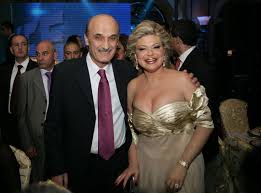Analysis/No Revolution in Lebanon’s Future
تحليل لزفي هارئيل من الهآرتس: لا مقومات مستقبلية لثورة في لبنان
Zvi Bar’el /Haaretz/February 12/19
Uproar over the self-immolation of a Lebanese driver who couldn’t bankroll his daughter’s tuition recalls start of Arab Spring, but Lebanon’s relative liberalism will likely dissolve any dissent into peaceful protest
George Zreik, a hardscrabble salaried driver, immolated himself last week outside the school his daughter was attending, creating a nationwide uproar in Lebanon.
Zreik could not meet the payments he owed his daughter’s private school and only asked the school for a document certifying that his daughter was studying there, so he could register her at a government school. The prestigious school informed him that he could not get such a document before paying his debts. All the fury that had accumulated within him for months, during which he had first removed his son from the school, then realized that his daughter would likewise not be able to complete her studies there, erupted in one outburst. He felt trapped inside a fiendish circle and decided to take his own life.
His story instantly made major headlines in Lebanese media, which blamed the new government that had been appointed only 10 days earlier, following a long and torturous gestation period lasting nine months.
“Will Zreik’s suicide lead to an Arab Spring-style revolution in Lebanon?” asked the daily Al-Nahar. “George’s murderers – stay away from the funeral,” wrote publicist and famed musician Ziad al-Rahbani, the son of Fairouz, the Arab word’s most famous singer. “George is a Shaheed,” wrote someone on Twitter, with schoolteachers staging a sit-down strike in front of the Ministry of Education until steps are taken to prevent a repeat of similar incidents.
The George Zreik affair contains all the components that triggered the mass protests that ignited the Arab Spring revolution in Tunisia nine years ago, but it’s doubtful this affair will yield similar results in Lebanon. In contrast to Tunisia in 2010, in which all channels of media protest were blocked by ordinances and brutal monitoring squads that barred government opponents from expressing themselves even on the internet, Lebanon is an open country. Communications are in private hands, with some outlets controlled by political parties and other movements. Some outlets are owned by private businessmen who are close to public figures and political leaders. However, social media is a wide-open field, which can dissolve anything that has the potential of developing into violent demonstrations, channeling it into protest writing.
It’s not that Lebanon was spared such demonstrations in the decades that have passed since its civil war. The wildest and most threatening ones were in 2005, after the murder of prime minister Rafik al-Hariri, as well as protests over non-collection of garbage. These threatened the fragile balance that prevented Lebanon’s slide into a war of barricades, allowing it to somehow survive, possibly because of the deep trauma left by the 15-year-long civil war.
The effort to hold together the sensitive ties that bind Lebanon’s society together was also evident in the political realm, which from time to time places the country in front of what looks like a political firing squad. The establishment of the current government didn’t have to take such a long time, with the delay causing immense economic harm due to the freezing of projects and the postponement of delivery of billions of dollars from donor states. At the end of lengthy negotiations and power struggles, Lebanon got the compromise government that was expected all along, in which Hezbollah holds the health portfolio and its abundant budgets. Hezbollah also controls a political bloc which gives it veto power over the most crucial decisions.
It seems that concerns over an internal rift overcame a fear of American and Saudi threats, both of which pressured Prime Minister Saad al-Hariri (son of slain Rafik) to curb the political clout wielded by Hezbollah, and thus by Iran. The big surprise was the new minister of state for administrative development, Dr. May Chidiac, the representative of the Christian Lebanese Forces party. She declared, “If Hezbollah was trying to challenge the international community, it would not have appointed a health minister who wears ties and shakes hands.”
Such a clean bill of health, coming from Chidiac of all people, shook not only her own party; even Hezbollah supporters and the left found it difficult to absorb the gesture. Chidiac, one of the most talented, experienced journalists in Lebanon, escaped an assassination attempt by the skin of her teeth in 2005, a year in which two of her senior colleagues were murdered. They were Jubran Tawini, the editor of al-Nahar, and Samir Kassir, also from al-Nahar. This was part of a drive by Syria to eliminate political opponents. Chidiac lost an arm and a lower part of her leg in that attempt on her life. She managed to recover and returned to the political arena.
The expectation was that she would head a hawkish anti-Hezbollah camp, not stroke the organization. But just like what happened with Lebanon’s president Michel Aoun, who was a fearless fighter against the Syrian occupation, going into exile for 15 years only to return as a Hezbollah ally, and just like Walid Jumblatt, the Druze leader, who often exchanged his support for Syria for battle fatigues against it, so does Chidiac come now holding a new political dictionary. She got rebuked by Pierre Abi-Saab, al-Akhbar’s deputy editor, who accused her of posing as a dove and of being a privileged intellectual, who from the heights of her arrogance is trying to diminish the demonic nature of Hezbollah.
Chidiac, who has a sharp tongue and pen, chose to reply, unlike her in customary manner, with statesmanlike words, just so the stitches holding this government together do not unravel.
https://www.haaretz.com/middle-east-news/.premium-no-revolution-in-lebanon-s-future-1.6920918


















